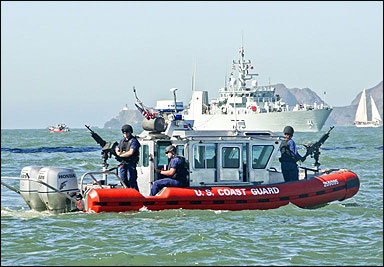A computer software system based on game theory was installed nine months ago at the ports of Los Angeles and Long Beach – the eighth busiest ports in the world – to protect the area’s harbors against terrorism attacks.
The anti-terrorism system, called Port Resilience Operational/Tactical Enforcement to Combat Terrorism system (Armor-Protect) and deployed by the U.S. Coast Guard, was created by University of Southern California computer scientist Milind Tambe.
Global threats of terrorism and other crimes have led to increased research on game theory for security application. Tambe says computational game theory provides a sound mathematical approach to maximize limited security resources, whether it is protecting critical infrastructure, intercepting the illegal flow of drugs, weapons and money, suppressing crime in urban areas or security in cyberspace.

Tambe will speak Thursday, Nov. 14, at 3 p.m. in Jacobs Believed in Me Auditorium in Featheringill Hall as part of an annual lecture series sponsored by the Department of Electrical Engineering and Computer Science at Vanderbilt University. Tambe’s topic is Security and Game Theory. He will outline key algorithmic principles, research results and discuss deployed systems and lessons learned.
Tambe and his USC research group – Teamcore – are pioneers in creating a security games framework to address large-scale terrorism, drug smuggling and other crime problems.
The Armor-Protect system uses a complex algorithm to scatter the Coast Guard’s boat patrol schedules, all in an effort to achieve maximum port security and make it almost impossible for the attackers to determine a particular target. Also, high-value locations such as bridges, ferry terminals and crowded piers are programmed to be patrolled more frequently. The United States currently has 361 ports.
“The goal is to make patrol patterns unpredictable for an enemy that is trying to conduct surveillance to plan an attack and yet simultaneously ensure that patrol time is used effectively to ensure maximum protection of high-value targets in the port,” Tambe said.

Armor-Protect was funded by the National Center for Risk and Economics Analysis of Terrorism Events (CREATE) through a contract from the U.S. Coast Guard Research and Development Center. Tambe and his colleagues recently formed a start-up, Armorway, to develop software that utilizes game theory to maximize operational efficiency.
The Coast Guard began using Armor-Protect system in Boston in 2011. New York followed suit and implemented the security system in early 2012. In Singapore, one of Tambe’s former students is using the software to enhance the security of the train system. Tambe said he hopes to expand the software’s international usage.
Algorithms developed by the Teamcore research group have been deployed for real-world use by several other agencies including the U.S. Federal Air Marshals service, LAX Police and the Los Angeles Sheriff’s Department.
Tambe is Helen N. and Emmett H. Jones Professor in Engineering, and Professor of Computer Science and Industrial and Systems Engineering at USC. He is a fellow of Association for Advancement of Artificial Intelligence, recipient of the Association for Computing Machinery Autonomous Agents Research Award, as well as recipient of the Christopher Columbus Fellowship Foundation Homeland security award.